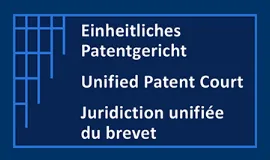‘UPC will lead to a concentration of patent litigation forces’
November 16, 2022
The Unified Patent Court will lead to a concentration of forces in the European patent litigation sector. That is the expectation of Richard Ebbink, partner at Brinkhof, and Georg Rauh, partner at Vossius. In September, their firms announced they would start cooperating in a new brand, Vossius and Brinkhof UPC Litigators. Kluwer IP Law interviewed Ebbink and Rauh.

‘As a European patent court, the UPC requires international teams of lawyers and patent attorneys. Together the Vossius and Brinkhof patent teams have the international experience, the technological breadth, the language skills, the energy and size for operating in the new system. Together we will be close to 100 professionals (between 30 and 35 litigators and between 60 and 65 patent-attorneys).’
The start of the Unitary Patent system and the UPC has been delayed for many years. When was it that the Brinkhof/Vossius initiative started?
‘We started talking many years ago. When Brexit and constitutional complaints seemed to bring UPC developments to a standstill, we did not give up. When it became clear, relatively recently, that the UPC would become a reality after all, for us the natural thing to do was to formalise our UPC co-operation, create our own brand and go public.’
 Richard Ebbink
Richard Ebbink
What kind of initiatives have you developed so far to make your cooperation successful?
‘We exchange information, we regularly meet (both virtual and physical), we have internal UPC webinars, and we have mock trials. Next to that, we are jointly meeting with clients worldwide, of course.’
Do you expect the UPC to get many cases soon? Or will the patent sector be reluctant to rely on this brand new court, whose jurisprudence has yet to develop?
‘We think the UPC will be a success. We have encountered very little scepticism with our clients. The system will cover a market the size of the US market, with rules tailored to patent proceedings, and with courts that are set up to deliver timely decisions and that are staffed with experienced judges used to granting injunctions in case of infringement.’
Have you been in contact with your clients about the UPC, particularly the issue of (not) opting out? What criteria are important in your advice to them?
‘Of course we have. There are however no general rules for opting-out. Much if not all will depend on the circumstances. If your company is driven by innovation, those circumstances will in principle point against opting-out.’
Has the list of appointed judges increased your confidence in the court?
‘Very much so. The list almost exclusively consists of experienced to very experienced judges. The list also confirms that our decision to create a German-Dutch co-operation has been the right decision: Of the seven legally qualified Appeal Judges, two are Dutch and two are German. Also, the predominant number of First Instance Court Judges both legal and technical are German or Dutch. Moreover, we think UPC litigation will be more intense in the North-West of Europe. That is where we are located.’
 Georg Rauh
Georg Rauh
What will change for litigation firms, now that the UPC starts functioning soon?
‘With the UPC creating an additional layer of enforcement options for European Patents over the current national systems, litigation strategies will become even more complex than nowadays. Thus, litigation law firms will need to develop new and creative strategies on how to best enforce smaller and larger patent portfolios of their clients.
Also, the speedy procedures at the UPC with completely new rules and no established case law will require litigation teams to be very effective. We think that for most cases, larger teams will be required to cope with the challenging requirements than for the usual national litigation case. In preparation of filing complaints with the new system, firms will of course have to closely study the new Rules of Procedure as well as gain experience in filing their briefs electronically.’
Are the quick UPC procedures positive? For both plaintiffs and defendants?
‘They certainly are. As is usually the case, that is better for plaintiffs than for defendants. Quick rulings are what European business may expect and what the UPC procedure was made for.’
It seems there have been issues with the new, secure login procedure for the UPC’s CMS. Have you experienced this as well?
‘We are aware of discussions about the authentication required to enter the electronic filing system (CMS). We have no doubt that the relevant technology will be on the side of the users of the system.’
Can we expect a wider reshuffle of the activities of European patent litigation firms due to the Unitary Patent system?
‘We think further movement in the market for patent litigators, further concentration of forces is likely. If not sooner, then later.’
Will smaller firms be able to cope?
‘They will likely be fine with handling the smaller cases, whereas it has to be seen how many small cases the new court will be able to attract, or whether those cases will rather stay on the national level. In any event, smaller firms will have trouble staffing big cases and staffing international cases. The timelines in the Rules of Procedure are relatively short. It will take manpower and international litigation experience to meet them. Vossius & Brinkhof have that size and experience, both from the legal as well as the technical side.’
You may also like















Concerned observer
So, if I understand these comments correctly, they seem to acknowledge that the very design of the UPC (and its rules) inherently favours plaintiffs with deep pockets and larger litigation firms. Remind me: from where did the individuals hail that designed the UPC and its rules? My recollection is that they came from larger litigation firms that represent plaintiffs with deep pockets. If the very design of the UPC is the product of blatant conflicts of interest, what hope is there for an acceptable resolution to the numerous (and thorny) conflicts of interest that will inevitably arise from the appointment of a very large number of active litigators as part-time judges?
Simona Fonzi
"smaller firms will have trouble staffing big cases and staffing international cases. The timelines in the Rules of Procedure are relatively short. It will take manpower and international litigation experience to meet them." Not SME friendly.
Attentive Observer
Is it at all a surprise that the design of the UPC (and its rules) inherently favours plaintiffs with deep pockets and larger litigation firms? It has been done with this in mind! I have not heard for a long time the fallacy stemming from staunch supporters of the UPC that it has been done in order to help SMEs. SMEs were a nice fig leaf to hide behind and make the parliaments ratify a treaty which they did not understand the faintest thing about. SMEs will be a prime target for big firms as they know very well that they will not have the financial resources to fight against the majors. As long as the fee for a request for nullity will be twice that for infringement this imbalance will remain. It is a scandal on its own. Arbitration chambers are foreseen in Lisbon and Ljubljana. I wonder who will be the members of those arbitration chambers. Most probably lawyers coming from the big lawyers firms having a deep finger in the pie. The amendment of the opt-out rules has the clear aim of forcing lots of patentees to stay in the UPC! More fees for all those firms. The whole UPC is a disgrace! This disgrace has been magnified by the designation of technical judges coming from internationally acting large industries and lawyers firms.
Patent robot
What about London? What about the (withdrawn) ratification of the UK needed for the current phase?